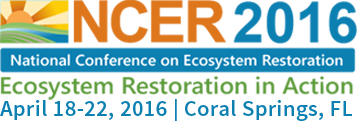Session Themes and Topics
The primary focus of NCER is to share lessons-learned from the conduct of large-scale ecosystem restoration program. NCER 2016 sessions will offer presentations and discussion on state-of-the-art methods and experiences relating to ecosystem restoration.
Click on each link below to view conference themes and subtopics:
- Science and decision-making collaboration
- Science governance
- Promoting actionable science
- Options for formal decision making processes (e.g. Structured Decision Making)
- Use of benefit-multiple impact analysis as a decision-making tool
- Stable funding mechanisms
- More sophisticated approaches to communications
- Improving implementation accountability
- Creating ecosystem restoration markets to attract private enterprise interest
- Incentives for local landowners and partners to collaborate with governments on ecosystem restoration efforts
- Long-term funding requirements and their value for planning, implementation, monitoring, and adaptive management
- Building flexibility and responsiveness into planning
- Learning from industry and/or non-traditional restoration businesses and programs
- Developing proactive approaches to address emerging issues
- Defining and understanding principles of adaptive management and adaptation planning
- Restoration vision and performance measures for success
- Prioritizing restoration projects and funding in support of restoration implementation
- Tools to support restoration implementation accountability and assessment of success
- Measuring restoration progress made towards restoration end goals
- Showcasing the value of ecosystem restoration to non-technical audiences
- Ecosystem monitoring and data management – essential tools for ecosystem restoration
- Measuring resilience
- Adaptation plans, flexibility, robustness
- Science communication to decision-makers, partners, and public
- Valuing ecosystem benefits – ecosystem services, predicting restoration benefits
- Ecosystem restoration need and importance
- Communication, partner engagement, and conflict resolution capacity building and training
- Defining Restoration Problems, Opportunities, and realistic goals and objectives
- Regulatory frameworks for scalable solutions, actions by multiple sectors
- Restoration partnerships and coordination
- Forums for intergovernmental and non-governmental dialogue to support large-scale restoration planning
- Nutrient reduction case studies for freshwater and marine environments
- Invasive species impacts
- Success / failure of ecosystem restoration projects to replicate natural abiotic and biotic processes
- Water quality and water quantity issues in ecosystem restoration
- Successes and failures of the adaptive management model in ecosystem restoration
- Watershed based restoration programs – the trend of the future?
- The power of models – Considerations of the balance between detail and uncertainty in the predictions of ecosystem restoration program outcomes
- Defining “large-scale” ecosystem restoration – how many small projects make one big program?
- Use of restored ecosystems as natural infrastructure to reduce risk from seal level rise
- The application of green infrastructure to enhance resiliency in urban environments
- Linkages between ecosystem restoration and coastal resiliency
- Linkages between ecosystem restoration and global warming
- Can ecosystem restoration be used to reduce impacts of climate change?
- Modeling and forecasting as tools to predict the effects of large-scale ecosystem restoration on regional impacts of climate change
- Impacts of reduced federal / state funding for large-scale ecosystem restoration programs?
- A regional comparison of government support and funding for ecosystem restoration initiatives
- Examining the role of government agencies, non-profit organizations, and private corporations in large-scale ecosystem restoration
- How to increase effectiveness of science, policy, and implementation of ecosystem restoration programs in the face of decreasing budgets
- Public-Private Partnerships – a new approach to implementing ecosystem restoration projects?
- New challenges and opportunities arising from emerging federal and state legislation for ecosystem restoration
- The importance of context for driving political and social support for ecosystem restoration

